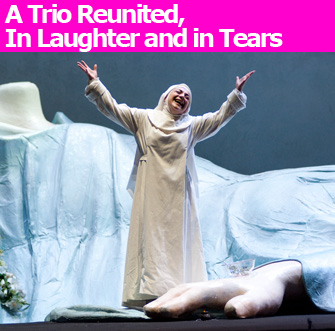 |
|
Tamar Iveri as Suor Angelica in the Puccini opera of the same name. Photo © Ian Patrick / Opéra National de Paris |
The operas of Giacomo Puccini, that most unapologetically sentimental of composers, are designed to make you cry. Possibly for that reason, I have always worn it as a badge of honor that – whereas Wagner, Strauss, Janacek, Berg and Britten can make me weep uncontrollably – I have always remained resolutely dry-eyed throughout every Puccini opera I have had the good fortune to attend.
That explains why I snorted derisively when the Australian woman seated next to me at the opening night performance of Il Trittico, Puccini’s triptych of three one-act operas, announced loudly to her companion – after having snored her way through Il Tabarro, the first opera – that she might well cry during the second, Suor Angelica, because it was about a mother and her baby. True to her word, she started blubbering about halfway through and search frenziedly her voluminous handbag for tissues in a vain attempt to stem the tide of snot emanating from her no less voluminous nose. The only problem is that I, too, was sobbing, my badge of honor well and truly removed.
Puccini believed that Suor Angelica was the strongest of the three operas and was constantly disappointed in the final years of his life because only the third, Gianni Schicchi, tended to be staged. This performance practice has dominated ever since; only a few years ago, for example, I saw Gianni Schicchi paired with Ravel’s L’Heure Espagnole at the Opéra de Paris at Bastille. That makes it a special pleasure to see all three staged together in this scintillating production by Luca Roconi, with conductor Philippe Jordan eliciting as fine a performance from the Orchestra of the Opéra National de Paris as I have heard.
On the basis of this production, I think Puccini was correct in his assessment of Suor Angelica. The first opera to have an all-female cast, it concerns a wealthy young woman who is forced to give up her illegitimate child and enter a convent. It has the delicacy and devastating impact that the melodramatic Il Tabarro and the rambunctiously comic Gianni Schicchi lack.
All three operas are nonetheless wonderful theatrical and musical creations. The first contains a glorious aria singing the praises of Paris and the genuinely comic third, in addition to including the well-known aria “O Mio Babbino Caro” (made even more famous by the soundtrack to the Merchant-Ivory movie A Room with a View), has a hymn to the joys of Florence. The subtlety of Puccini’s musical line and an unexpected harmonic complexity are evident throughout.
The singing in all three operas is exceptional. Juan Pons demonstrates his great diversity by playing both the murderous Michele in Il Tabarro and the brilliant schemer Gianni Schicchi. Of the other singers, Oksana Dyka as Giorgetta in Il Tabarro and Tamar Iveri as Suor Angelica stand out. The set design for each opera, while maintaining the same shape, couldn’t be more different, with the settings ranging from the silhouette of a Parisian barge in the first, to the huge supine figure of a nun in the second, to the opulence of a Florentine home in the third.
If you are in Paris in October, make sure you see this marvelous production. And don’t forget to bring a handkerchief.
Opéra National de Paris: Place de la Bastille, 75012 Paris. Métro: Bastille. Tel.: 0 892 89 90 90 or + 33 (0)1 71 25 24 23 (from abroad). Remaining performances: October 7, 12, 14, 16, 19, 21, 25, 27 at 7pm; October 10 at 2:30pm. Tickets: €5-€140. www.operadeparis.fr
Support Paris Update by ordering music by Puccini from Paris Update’s Amazon store at no extra cost. Click on your preferred Amazon location: U.K., France, U.S.
Buy other music and books from the Paris Update store: U.K., France, U.S.
Reader Reaction: Click here to respond to this article (your response may be published on this page and is subject to editing).
© 2010 Paris Update
Favorite